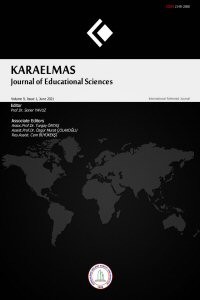İngilizce’nin Yabancı Dil Olarak Öğretildiği Sınıflarında Motivasyon Stratejileri Kullanımı: Türkiye’deki İngilizce Öğretmenleri İçin Bir Rehber
Motivasyon yabancı dil öğreniminde başarıyı belirleyen son derece önemli bir etken olmasına rağmen, dil öğrenenleri motive etme yolları yabancı dil eğitimi araştırmalarında yeterince ilgi görmemiştir. Oysa ki, yabancı dil öğretmenlerinin motivasyon artırmaya yönelik yollarla ilgili yönlendirmeye ihtiyacı vardır. Bu yüzden, bu araştırma Türkiye’de yabancı dil olarak İngilizce öğretiminde önemli olduğu düşünülen motivasyon stratejilerini ortaya çıkarmayı ve Türkiye’deki İngilizce öğretmenlerine faydalanabilecekleri bir grup makro-strateji sunmayı amaçlamaktadır. Ayrıca, önem verilen stratejilerle sınıf ortamında kullanılan stratejileri karşılaştırarak, önemli görüldüğü halde ihmal edilen motivasyon stratejilerini ortaya çıkarmak bu çalışmanın diğer bir hedefidir. Bu amaçla, katılımcı İngilizce öğretmenlerinden Dörnyei ve Csizer 1998 tarafından öne sürülen 50 motivasyon stratejisini önemleri ve kullanım sıklıkları bakımından değerlendirmeleri istenmiştir. Bu değerlendirmelere dayanarak en önemli görülen on strateji ve en sık kullanılan on strateji olmak üzere iki grup belirlenmiş ve önemli görüldüğü halde eğitim-öğretim ortamlarınca bu denli kullanılmayan stratejiler vurgulanmıştır
Anahtar Kelimeler:
Motivasyon, Motivasyon Stratejileri, Türkiye’de Yabancı Dil olarak İngilizce Öğretimi.
The Use of Motivational Strategies in EFL Classrooms: A Guide for Turkish EFL Teachers
Motivation is a highly influential factor in determining success in second/foreign language learning; however, the question of how to motivate language learners has not received sufficient attention in L2 research. In the literature, there is a need for some guidance for language teachers as to the ways of fostering motivation. Therefore, the present study aims to explore the mostly valued motivational strategies in Turkish EFL context and offer a set of motivational macro-strategies which can serve teachers of English in Turkey as commandments. It is also another purpose of the study to find out the frequency of motivational strategy use in language classes and to identify and highlight the mismatch between the attached importance and actual use of the strategies. The participant teachers were asked to rate 50 strategies that were proposed by Dörnyei and Csizer 1998 in terms of their importance and frequency of use. Based on their responses a list of ten most important motivational strategies was formed, the most frequently used strategies were identified and the underutilized strategies were highlighted
Keywords:
Motivation, Motivational Strategies, Turkish EFL Context,
___
- Alexander, P. A. & Winne, P. H. (Eds.). (2006). Handbook of educational psychology (Second edition). Taylor & Fra. :New York.
- Al-Kaboody, M. (2013). Second language motivation: The role of teachers in learners’ motivation. Journal of Academic and Applied Sciences, 3(4), 45-54.
- Benabou, R. & Tirole, J.(2002). Self-confidence and personal motivation. The Quarterly Journal of Economics, 117, 871-915.
- Brown, H.D. (2001). Teaching by principles (2nd ed). Longman: New York.
- Capen, R. (2010). The role of the teacher and classroom environment in reading motivation. Illinois Reading Council Journal, 38(4), 20-26.
- Chambers, G. N. (1999). Motivating language learners. Great Britain: WBC Book Manufacturers Ltd.
- Cheng, H.-F. & Dörnyei, Z. (2007). The use of motivational strategies in language instruction: The case of EFL teaching in Taiwan. Innovation in Language Learning and Teaching, 1(1), 153-174.
- Crookes, G. & Schmidt, R.W. (1991) Motivation: Reopening the research agenda. Language Learning 41, 469-512.
- D’Andrade, R. G. & Strauss, C. (Eds.) (1992). Human motives and cultural model. Cambridge University Press: Cambridge.
- Deci, E.L. & Ryan, R.M. (1985) Intrinsic motivation and self-determination in human behavior. Plenum: New York.
- Dörnyei, Z., & Kubanyiova, M. (2014). Motivating learners, motivating teachers: Building vision in the language classroom. Cambridge: Cambridge University Press.
- Dörnyei, Z. (2005). The Psychology of the Language Learner: Individual Differences in Second Language Acquisition. Mahwah, NJ: Lawrence Erlbaum.
- Dörnyei, Z. & Clement, R. (2001). Motivational characteristics of learning different target languages: Results of a nationwide survey. In Z. Dornyei & R. Schmidt (Eds.), Motivation and second language acquisition (Technical Report #23, pp. 399-432). Honolulu: University
- Dörnyei, Z. & Csize´r, K. (1998). Ten commandments for motivating language learners: results of an empirical study. Language Teaching Research, 2(3), 203-229.
- Dörnyei, Z. (1996). Moving language learning motivation to a larger platform for theory and practice. In R. Oxford (Ed.) Language learning motivation: The new century (pp. 71-80). Honolulu: University of Hawaii, Second Language Teaching and Curriculum Center.
- Dörnyei, Z. (1994). Motivation and motivating in the foreign language classroom. Modern Language Journal, 78, 273- 284.
- Dörnyei, Z. (1990). Conceptualizing motivation in foreign-language learning. Language Learning, 40, 45-78
- Ehrman, M. E. (1996). Second language learning difficulties: Looking beneath the surface. Thousand Oaks, CA: Sage.Ellis, R. (1995) Studies in Second Language Acquisition. Cambridge: CambridgeUniversity Press.
- Ericsson, K. A., & Krampe, R. T., & Clemens, T. (1993). The role of deliberate practice in the acquisition of expert performance. Psychological Review, 100(3), 363-406.
- Gardner, R. C. (1985). Social psychology and second language learning: The role of attitudes and motivation. Edward Arnold: London.
- Grabe, W. (2009). Reading in a second language: Moving from theory to practice. USA: Cambridge University Press.
- Harmer, J. (2001). The practice of English language teaching. China: Longman.
- Oxford, R. L. & Shearin, J. (1994). Language Learning Motivation: Expanding the theoretical framework. Modern Language Journal, 78, 12-28.
- Saville-Troike, M. (2006). Introducing second language acquisition. USA: Cambridge University Press.
- Van Lier, L. (1996). Interaction in the language curriculum: Awareness, autonomy and authenticity. UK: Pearson Education Limited.
- Williams, M. & Burden, R. (1997). Psychology for Language Teachers. Cambridge, England: Cambridge University Press.
- Yang, Y. (2008). The importance of the teacher for developing interest in learning English by Chinese students. International Educational Studies, 1, 95-100.
- Young, D.J. (ed.) (1999.) Affect in foreign language and second language learning. McGraw-Hill: Boston, MA.
- ISSN: 2148-2888
- Yayın Aralığı: Yılda 2 Sayı
- Başlangıç: 2013
- Yayıncı: Zonguldak Bülent Ecevit Üniversitesi
Sayıdaki Diğer Makaleler
Yabancı Dil Eğitiminde Öz-Değerlendirmenin Gücü
Ortaokul Öğrencilerinin Sayı Duyularının Okul Türleri Açısından İncelenmesi
Çeşitlilik ve Sosyal Adalet Ölçeği: Geçerlik ve Güvenirlik Çalışması
Grup Değişmezliği Özelliğinin Farklı Eşitleme Yöntemlerinde İncelenmesi
